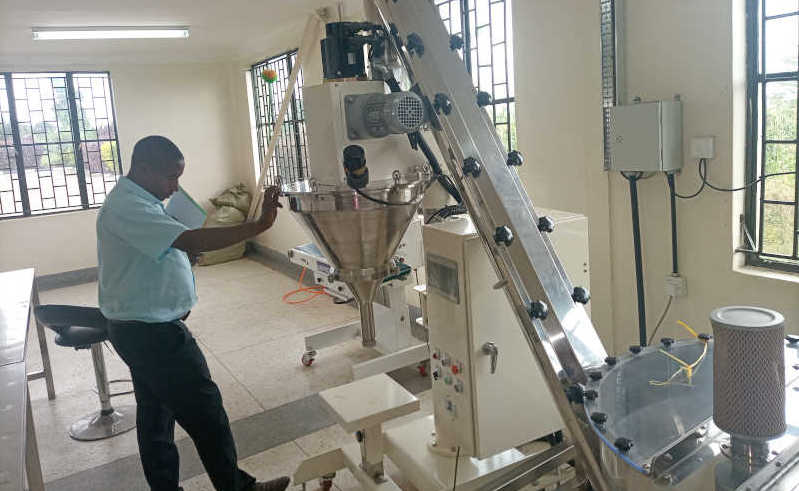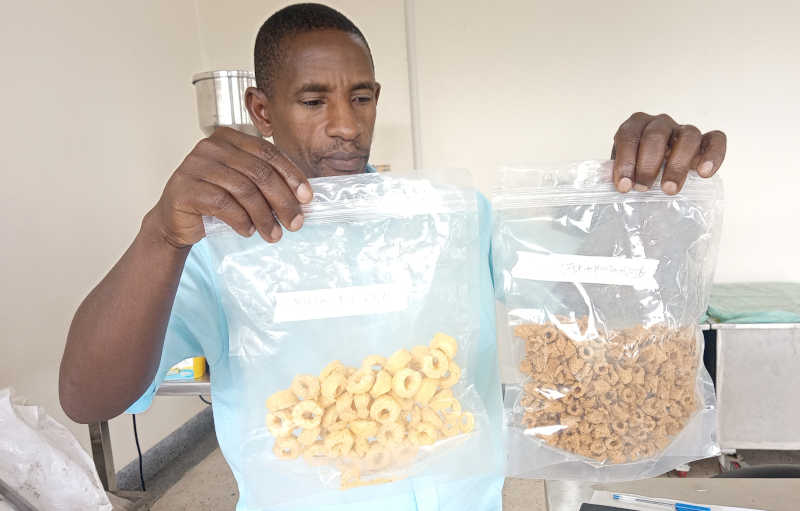News
NARO adds value to its research through product dev’t and business incubation

NARO’s Dr. Kashub at one of the Extruders
It has been said that the ordinary crop of maize is used to produce 25,000 different products in the United States thanks to the advanced levels of industrialization but also very close ties between the private sector (industry) research community and the farmers.
From producing pharmaceutical grade starch and other health products like baby syrups, to industrial inputs like garment starch as well as acting as an input into the food industry, maize – mostly known as corn in the US, is more of an industrial input than just a staple food – as the case is in most African countries.
In Uganda, on the other hand, the by-products of maize are countable, and yet it’s the most grown cereal. The reasons for the underdevelopment of the maize value chain, range from low levels of research, lack of coordination the research community and industry, to transform the maize into a versatile input.
This disconnect can largely explain the boom and bust cycles that farmers suffer from since the product has limited uses but its market scope is very narrow and stops at those who seek to use it as food or feed.
Fortunately, the National Agricultural Research Organisation (NARO) has set out to address this gap by establishing what it has baptized as the Food Bioscience and Agri-business centre aka FBA.
The FBA located at the National Agricultural Research Laboratories (NARL), Kawanda, was recently opened to help transform Uganda’s agricultural produce from their primary raw state into value-added commercial products that can be appeal to the middle class and help to attract a higher price for the investors as and hope-fully the farmers.
According to Dr. Steven Tumwesigye Kashub, the FBA, which is open to the public, provides three major services; Provide a wide range of advanced value-addition equipment to entrepreneurs especially those involved in the processing of cereals into other products, provide laboratory services for a whole of products as well as business incubation.
Kashub cited equipment like extruders, driers, a bakery and shaping machines that can collectively help to produce snacks similar to Gorillos – a crunchy product made from starch and other products like break. The extruders are machines that produce instant products that can be consumed in form of snacks or eaten as porridge, when mixed with hot water.
Kashub says they encourage partnerships with the private sector to advance their proven research products into commercial products, because they want to reverse the trend that is characterized with domination of foreigners in the industrial sector.
During a tour of the facility for example, the partnership was evident as people from different companies had come to make use of the facilities.
The staff of Maganjo Grain Millers were busy wrapping their Just Baked bread using the centre’s bakery.
The centre also provides laboratory and quality management services which help entrepreneurs to test and standardize their products. The laboratory services are also handy in ensuring that products easily meet the quality and safety standards required by the Uganda National Bureau of Standards (UNBS).
Kashub says: “At the lab, we do a range of tests ranging from physical, chemical, micro-biological tests. These can help the entrepreneur and the consumer to know the nutrient composition of the product. This not only helps you to secure UNBS certification, it can help you to improve the product through fortification and also use the information for marketing purposes.”
The agri-business unit, on the other hand, is the business development arm of the project. The centre nurtures agriprenuers with skills ranging from business proposal writing to marketing and branding.
Kashub says: “We are trying to create future industrialists. When you look closely, we have a poor linkage between research and industry. That is why our industries are foreign owned. We decided to start here so that our industries constantly link with research for knowledge-based value addition.
Since its establishment, the centre has graduated three enterprises who have a range of products ranging from powdered tomatoes, instant or pre-cooked and packaged beans, and several other products made out of pumpkin.
According to Kashub, potential clients – who should be registered businesses with the registrar of companies, can submit a formal application to the director upon payment of a 100,000 registration fee.
for those that may want to use the facilities, Kashub says they are charged a relatively small amount to meet the cost of utilities and maintenance.
According to Kashub, the services offered including provision of expertise, equipment, are a golden opportunity especially for resource-constrained start-ups to take advantage of and launch themselves into the market.
Comments























